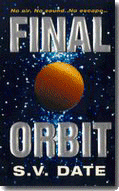Excerpt from Final Orbit
 At first he laughed at the snub. They couldn't possibly get away with
it. The press that not long ago had deified him, the public that for
three decades had stood in awe of his exploits, the president who just
two years earlier had given him a medal, they wouldn't allow it. He
would ride it out until the usurpers in shuttle management were purged,
and then assume his rightful place at the top of the pyramid. Santich
played his new role straight, attending every SRQA meeting, digging
into the gritty technical issues that for two decades he'd largely
ignored, and in general trying to prove that they wouldn't break him so
easily.
At first he laughed at the snub. They couldn't possibly get away with
it. The press that not long ago had deified him, the public that for
three decades had stood in awe of his exploits, the president who just
two years earlier had given him a medal, they wouldn't allow it. He
would ride it out until the usurpers in shuttle management were purged,
and then assume his rightful place at the top of the pyramid. Santich
played his new role straight, attending every SRQA meeting, digging
into the gritty technical issues that for two decades he'd largely
ignored, and in general trying to prove that they wouldn't break him so
easily.But months passed, then years. Five men aboard Discovery got America back in space, the shuttle program resumed a slow but steady pace, and Capt. Santiago "Santy" Santich, USN, Ret., was all but forgotten. His cohorts in the corps, those astronauts chosen at the tail end of Apollo, had retired. The younger ones still quietly admired him as a legend and a moonwalker, but they shared the nearly unanimous sentiment that he'd violated the brotherhood's code recklessly risked the sacred mission, and, ultimately, deserved what he got. Besides, he was no longer chief astronaut and no longer doled out the all-important flight assignments. Publicly or even privately taking his side meant jeopardizing their own chances of getting into orbit. Why risk that for someone who'd already flown six times? They knew on which side their bread was buttered, and took care to avoid his very name.
And though Santich had never thought much of the press, he had assumed that at least one of them would expose the injustice. After all, whistle-blowers at nuclear power plants, oil companies and even the Department of Energy were deemed heroes, the stuff on which the awards that Santich thought were the journalist's reason for existence were based. But he soon learned that the print and television reporters who hungered after glory and fame quickly lost interest in space after the finger-pointing for Challenger and the grand adventure of Discovery were finished. The only media left covering space were the same sniveling sycophants who had covered the program in the years before Challenger. Why interview Santich and lose access to those astronauts who actually flew?
Pride fermented into anger, anger into resentment, and resentment, finally, into bitterness. Emily tolerated the first two, but not the third. What do you have to prove? she had asked. You've had more opportunity and good fortune than just about anyone who has ever lived. She suggested, then pleaded with him to leave Houston and return to Florida. If not for himself then for his grandchildren, who were growing up without him, just as his children had done. Four years earlier she decided she'd waited enough, and went home without him.
Over the past months, he'd realized she had been right, and it was time to give up. They'd started talking again, but he didn't yet know whether she'd have him back. The occasional cards and letters they had exchanged told him she was no longer Mrs. Ninth Man on the Moon, but had grown into Emily Pembroke Santich, self-confident, self sufficient, adult woman. This May 18, six more weeks, would be their thirty-sixth wedding anniversary. He would return to her then, or would try to, anyway. It was a good time to leave NASA. In June he would turn fifty-nine. That was early retirement for most jobs; it would be good enough for him. Unlike his pals who had left NASA soon after their flights for cushy consulting jobs in the aerospace industry, he would never be rich. But with the Navy and civil service pensions--twenty-nine years in one; thirty-five years in the other--he would do okay. More than okay. The kids were out of school, the house was paid for, and he wouldn't be around for more than ten or fifteen years anyway.
It would be nice, finally, to take the rotting canvas cover off that old but nearly new Boston Whaler, put her in the water, get out in the Gulf. Not the dirty, brown Gulf off Galveston but the sparkling green Gulf off Naples, or even further south in the Ten Thousand Islands, or further still off the Keys. Just sit, all day long, with nothing to do but wait for the Big One to strike. Just him, and maybe a grand child or two, to sit and fish. Something he hadn't had time for, or rather, hadn't made time for, in half a century.
The more he thought about leaving, the more he couldn't wait to walk into Bruce's office and tell him to take his assistant to the directorship and stick it up his tight ass. April 12: That would be the day to do it. The sixteenth anniversary of his first flight, when Bruce was still a snotty, stuck-up rookie just two years in the corps and still four years away from flying. The tenth anniversary had been a big deal, with ceremonies and picnics at Johnson, Kennedy, Marshall and Dryden. The seventeenth would be nothing like that, but it would be something. People would sit up and notice, if only to realize they didn't have Santy Santich to feel sorry for anymore.
He permitted himself a sigh and stretched back into the sofa, letting his eyes drop shut for a moment before snap ping them open. NASA Select, the agency's in-house television channel, was again showing the inside of the Mission Control room, which it did whenever the crew was asleep or otherwise wanted privacy or, as was often the case, the radio link between the orbiter and the satellites degraded to the point where microwave transmission needed for TV downlink was impossible. The screen showed a dozen or so ground controllers at their monitors, chatting with one another or milling about. In the second row down, along the right-hand side of the aisle just in front of the flight surgeon, sat the capcom, the capsule communicator. Back in the days of Mercury, the astronauts had decreed that only other astronauts were worthy enough to talk to the men in orbit. Successive astronauts had kept the tradition alive, so that to this day, the only voice heard on NASA Select speaking with orbiting astronauts was that of another astronaut.
And as Santich laid his head back against the love seat's cushion, capcom Mike Farina answered one of the Donald Duck voices that, yes, the customer wanted to study the satellite's health check for a few more minutes before giving the go-ahead to start Step 27-Lima.
While waiting, the other Donald Duck voice started humming "Rocket Man," to which Donald Duck Number One answered with "Space Oddity." Farina advised the spacewalkers not to give up their day jobs just yet.
Santich missed the hijinks. He wouldn't have recognized the songs anyway. They weren't of his generation. Instead his eyes stayed closed for ever longer periods before re opening. He had intended to watch all six hours of the space walk, as well as the second one the following night even though they wouldn't end until 3:00 A.M. Houston time.
NASA Select returned to live video from Atlantis's cargo bay, where the two spacewalkers hovered against the star board rail beside the satellite they were working on. Within seconds the picture returned to the Mission Control room. And a few moments later, in the lower right-hand corner of Santich's set, where the image was both tinted blue and warped into a convex curve, the flight surgeon quickly reached forward to his monitor, and the broadcast picture was replaced with a test pattern.
Whether anyone noticed or linked the two was impossible to say. Certainly no one at 463 Gulfbreeze Terrace did. The Dean of American Astronauts had fallen asleep.
Copyright © 1997 Shiristi V. DateBack to the books page
Back to the links page
